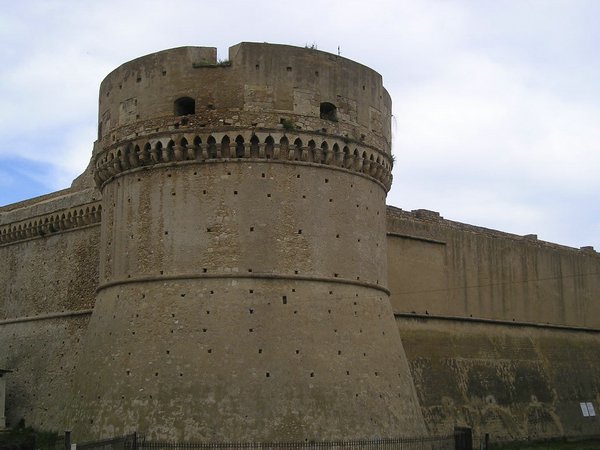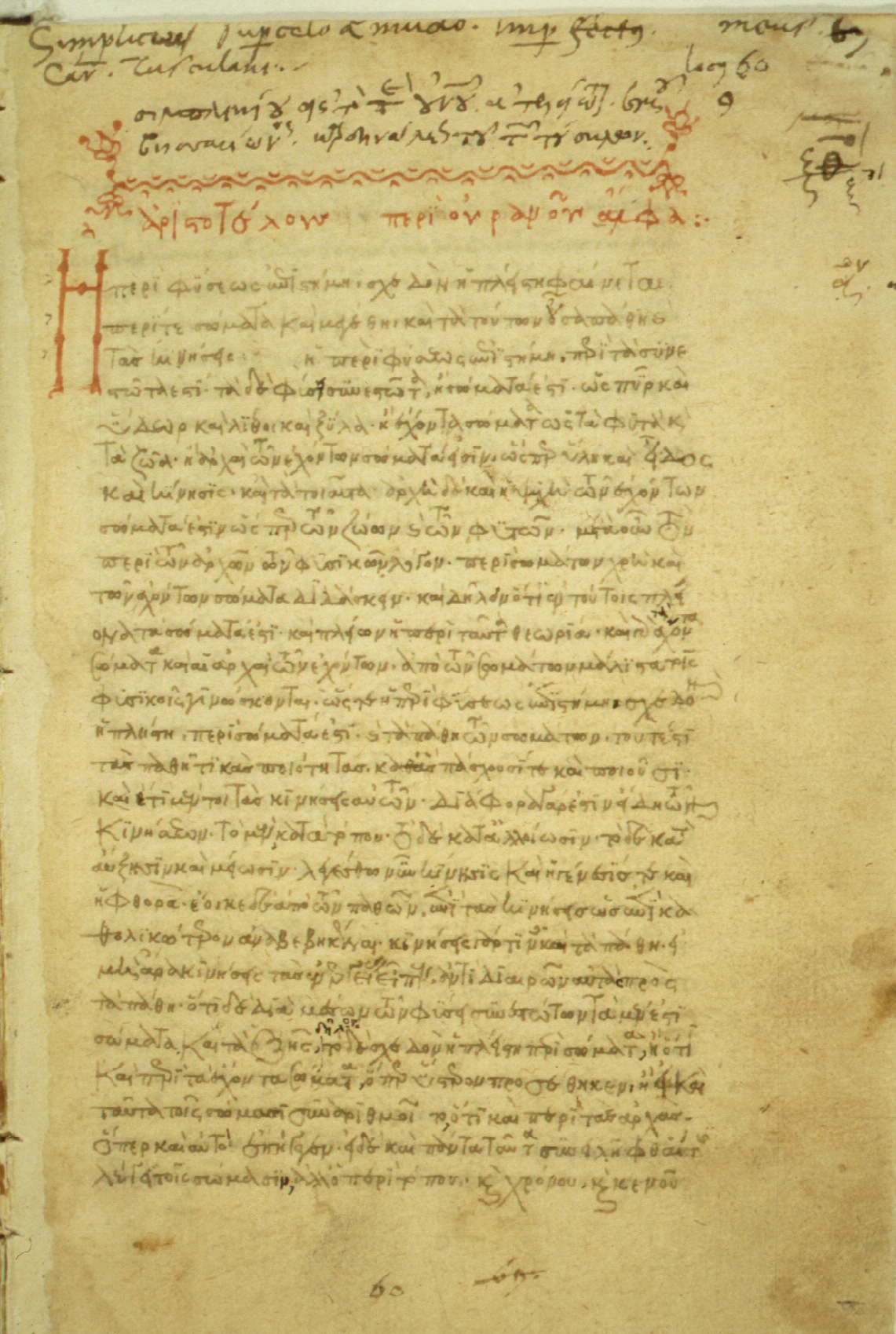|
Timaeus Of Locri
Timaeus of Locri (; grc, Τίμαιος ὁ Λοκρός, Tímaios ho Lokrós; la, Timaeus Locrus) is a character in two of Plato's dialogues, ''Timaeus'' and '' Critias''. In both, he appears as a philosopher of the Pythagorean school. If there ever existed a historical Timaeus of Locri, he would have lived in the fifth century BC, but his historicity is dubious since he only appears as a literary figure in Plato's works; all other ancient sources are either based on Plato or are fictional accounts. Historicity In Plato's works, Timaeus appears as a wealthy aristocrat from the Greek colony of Lokroi Epizephyrioi (present-day Locri in Calabria), who had served in high offices in his native town before coming to Athens, where the dialogue of ''Timaeus'' is set. Plato does not explicitly label Timaeus a Pythagorean, but leaves enough hints for the reader to infer this. He appears competent in all areas of ancient philosophy, especially natural philosophy and astronomy. In ant ... [...More Info...] [...Related Items...] OR: [Wikipedia] [Google] [Baidu] |
Plato
Plato ( ; grc-gre, Πλάτων ; 428/427 or 424/423 – 348/347 BC) was a Greek philosopher born in Athens during the Classical period in Ancient Greece. He founded the Platonist school of thought and the Academy, the first institution of higher learning on the European continent. Along with his teacher, Socrates, and his student, Aristotle, Plato is a central figure in the history of Ancient Greek philosophy and the Western and Middle Eastern philosophies descended from it. He has also shaped religion and spirituality. The so-called neoplatonism of his interpreter Plotinus greatly influenced both Christianity (through Church Fathers such as Augustine) and Islamic philosophy (through e.g. Al-Farabi). In modern times, Friedrich Nietzsche diagnosed Western culture as growing in the shadow of Plato (famously calling Christianity "Platonism for the masses"), while Alfred North Whitehead famously said: "the safest general characterization of the European philosophica ... [...More Info...] [...Related Items...] OR: [Wikipedia] [Google] [Baidu] |
Late Antiquity
Late antiquity is the time of transition from classical antiquity to the Middle Ages, generally spanning the 3rd–7th century in Europe and adjacent areas bordering the Mediterranean Basin. The popularization of this periodization in English has generally been credited to historian Peter Brown (historian), Peter Brown, after the publication of his seminal work ''The World of Late Antiquity (1971), The World of Late Antiquity'' (1971). Precise boundaries for the period are a continuing matter of debate, but Brown proposes a period between the 3rd and 8th centuries AD. Generally, it can be thought of as from the end of the Roman Empire's Crisis of the Third Century (235–284) to the early Muslim conquests (622–750), or as roughly contemporary with the Sasanian Empire (224–651). In the West its end was earlier, with the start of the Early Middle Ages typically placed in the 6th century, or earlier on the edges of the Western Roman Empire. The Roman Empire underwent considerable ... [...More Info...] [...Related Items...] OR: [Wikipedia] [Google] [Baidu] |
Doric Greek
Doric or Dorian ( grc, Δωρισμός, Dōrismós), also known as West Greek, was a group of Ancient Greek dialects; its varieties are divided into the Doric proper and Northwest Doric subgroups. Doric was spoken in a vast area, that included northern Greece (Acarnania, Aetolia, Epirus, western and eastern Locris, Phocis, Doris, and possibly ancient Macedonia), most of the Peloponnese (Achaea, Elis, Messenia, Laconia, Argolid, Aegina, Corinth, and Megara), the southern Aegean ( Kythira, Milos, Thera, Crete, Karpathos, and Rhodes), as well as the colonies of some of the aforementioned regions, in Cyrene, Magna Graecia, the Black Sea, the Ionian Sea and the Adriatic Sea. It was also spoken in the Greek sanctuaries of Dodona, Delphi, and Olympia, as well as at the four Panhellenic festivals; the Isthmian, Nemean, Pythian, and Olympic Games. By Hellenistic times, under the Achaean League, an Achaean Doric koine appeared, exhibiting many peculiarities common t ... [...More Info...] [...Related Items...] OR: [Wikipedia] [Google] [Baidu] |
Archytas
Archytas (; el, Ἀρχύτας; 435/410–360/350 BC) was an Ancient Greek philosopher, mathematician, music theorist, astronomer, statesman, and strategist. He was a scientist of the Pythagorean school and famous for being the reputed founder of mathematical mechanics, as well as a good friend of Plato. Life and work Archytas was born in Tarentum, Magna Graecia and was the son of Mnesagoras or Hadees. For a while, he was taught by Philolaus, and was a teacher of mathematics to Eudoxus of Cnidus. Archytas and Eudoxus' student was Menaechmus. As a Pythagorean, Archytas believed that only arithmetic, not geometry, could provide a basis for satisfactory proofs. Archytas is believed to be the founder of mathematical mechanics.: ''Vitae philosophorum'' As only described in the writings of Aulus Gellius five centuries after him, he was reputed to have designed and built the first artificial, self-propelled flying device, a bird-shaped model propelled by a jet of what was prob ... [...More Info...] [...Related Items...] OR: [Wikipedia] [Google] [Baidu] |
Crotone
Crotone (, ; nap, label= Crotonese, Cutrone or ) is a city and ''comune'' in Calabria, Italy. Founded as the Achaean colony of Kroton ( grc, Κρότων or ; la, Crotona) in Magna Graecia, it was known as Cotrone from the Middle Ages until 1928, when its name was changed to the current one. In 1992, it became the capital of the newly established Province of Crotone. , its population was about 65,000. History Croton's ''oikistes'' (founder) was Myscellus, who came from the city of Rhypes in Achaea (ancient region), Achaea in the northern Peloponnese. He established the city in c. 710 BC and it soon became one of the most flourishing cities of Magna Graecia Magna Graecia (, ; , , grc, Μεγάλη Ἑλλάς, ', it, Magna Grecia) was the name given by the Romans to the coastal areas of Southern Italy in the present-day Italian regions of Calabria, Apulia, Basilicata, Campania and Sicily; these re ... with a population between 50,000 and 80,000 around 500 BC. Its inhabi ... [...More Info...] [...Related Items...] OR: [Wikipedia] [Google] [Baidu] |
Porphyry (philosopher)
Porphyry of Tyre (; grc-gre, Πορφύριος, ''Porphýrios''; ar, فُرْفُورِيُوس, ''Furfūriyūs''; – ) was a Neoplatonic philosopher born in Tyre, Roman Phoenicia during Roman rule. He edited and published '' The Enneads'', the only collection of the work of Plotinus, his teacher. His commentary on Euclid's ''Elements'' was used as a source by Pappus of Alexandria. He wrote original works in the Greek language on a wide variety of topics, ranging from music theory to Homer to vegetarianism. His '' Isagoge'', or ''Introduction'', an introduction to logic and philosophy, was the standard textbook on logic throughout the Middle Ages in its Latin and Arabic translations. Porphyry was, and still is, also well-known for his anti-Christian polemics. Through works such as ''Philosophy from Oracles'' and '' Against the Christians'' (which was banned by Constantine the Great), he was involved in a controversy with early Christians. Biography The '' Suda' ... [...More Info...] [...Related Items...] OR: [Wikipedia] [Google] [Baidu] |
Simplicius Of Cilicia
Simplicius of Cilicia (; el, Σιμπλίκιος ὁ Κίλιξ; c. 490 – c. 560 AD) was a disciple of Ammonius Hermiae and Damascius, and was one of the last of the Neoplatonists. He was among the pagan philosophers persecuted by Justinian in the early 6th century, and was forced for a time to seek refuge in the Persian court, before being allowed back into the empire. He wrote extensively on the works of Aristotle. Although his writings are all commentaries on Aristotle and other authors, rather than original compositions, his intelligent and prodigious learning makes him the last great philosopher of pagan antiquity. His works have preserved much information about earlier philosophers which would have otherwise been lost. Life Simplicius was a disciple of Ammonius Hermiae, and Damascius, and was consequently one of the last members of the Neoplatonist school. The school had its headquarters in Athens. It became the centre of the last efforts to maintain Hellenistic r ... [...More Info...] [...Related Items...] OR: [Wikipedia] [Google] [Baidu] |
Aristotle
Aristotle (; grc-gre, Ἀριστοτέλης ''Aristotélēs'', ; 384–322 BC) was a Greek philosopher and polymath during the Classical Greece, Classical period in Ancient Greece. Taught by Plato, he was the founder of the Peripatetic school of philosophy within the Lyceum (classical), Lyceum and the wider Aristotelianism, Aristotelian tradition. His writings cover many subjects including Physics (Aristotle), physics, biology, zoology, metaphysics, logic, ethics, aesthetics, Poetics (Aristotle), poetry, theatre, music, rhetoric, psychology, linguistics, economics, politics, meteorology, History of geology, geology, and government. Aristotle provided a complex synthesis of the various philosophies existing prior to him. It was above all from his teachings that Western culture, the West inherited its intellectual lexicon, as well as problems and methods of inquiry. As a result, his philosophy has exerted a unique influence on almost every form of knowledge in the West a ... [...More Info...] [...Related Items...] OR: [Wikipedia] [Google] [Baidu] |
Proclus
Proclus Lycius (; 8 February 412 – 17 April 485), called Proclus the Successor ( grc-gre, Πρόκλος ὁ Διάδοχος, ''Próklos ho Diádokhos''), was a Greek Neoplatonist philosopher, one of the last major classical philosophers of late antiquity. He set forth one of the most elaborate and fully developed systems of Neoplatonism and, through later interpreters and translators, exerted an influence on Byzantine philosophy, Early Islamic philosophy, and Scholastic philosophy. Biography The primary source for the life of Proclus is the eulogy ''Proclus, or On Happiness'' that was written for him upon his death by his successor, Marinus, Marinus' biography set out to prove that Proclus reached the peak of virtue and attained eudaimonia. There are also a few details about the time in which he lived in the similarly structured ''Life of Isidore'' written by the philosopher Damascius in the following century. According to Marinus, Proclus was born in 412 AD in ... [...More Info...] [...Related Items...] OR: [Wikipedia] [Google] [Baidu] |
Philolaus
Philolaus (; grc, Φιλόλαος, ''Philólaos''; ) was a Greek Pythagorean and pre-Socratic philosopher. He was born in a Greek colony in Italy and migrated to Greece. Philolaus has been called one of three most prominent figures in the Pythagorean tradition and the most outstanding figure in the Pythagorean school. Pythagoras developed a school of philosophy that was dominated by both mathematics and mysticism. Most of what is known today about the Pythagorean astronomical system is derived from Philolaus's views. He may have been the first to write about Pythagorean doctrine. According to August Böckh (1819), who cites Nicomachus, Philolaus was the successor of Pythagoras. He argued that at the foundation of everything is the part played by the limiting and limitless, which combine in a harmony. With his assertions that the Earth was not the center of the universe ( geocentrism), he is credited with the earliest known discussion of concepts in the development of helioc ... [...More Info...] [...Related Items...] OR: [Wikipedia] [Google] [Baidu] |
Lives And Opinions Of Eminent Philosophers
Diogenes Laërtius ( ; grc-gre, Διογένης Λαέρτιος, ; ) was a biographer of the Greek philosophers. Nothing is definitively known about his life, but his surviving ''Lives and Opinions of Eminent Philosophers'' is a principal source for the history of ancient Greek philosophy. His reputation is controversial among scholars because he often repeats information from his sources without critically evaluating it. He also frequently focuses on trivial or insignificant details of his subjects' lives while ignoring important details of their philosophical teachings and he sometimes fails to distinguish between earlier and later teachings of specific philosophical schools. However, unlike many other ancient secondary sources, Diogenes Laërtius generally reports philosophical teachings without attempting to reinterpret or expand on them, which means his accounts are often closer to the primary sources. Due to the loss of so many of the primary sources on which Diogenes rel ... [...More Info...] [...Related Items...] OR: [Wikipedia] [Google] [Baidu] |








